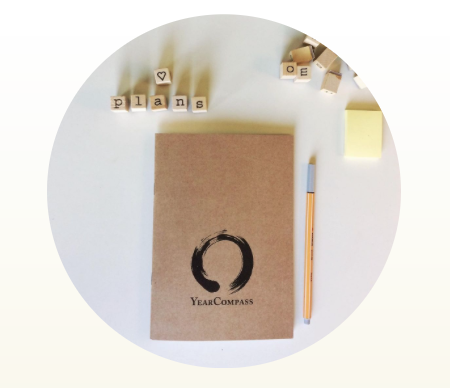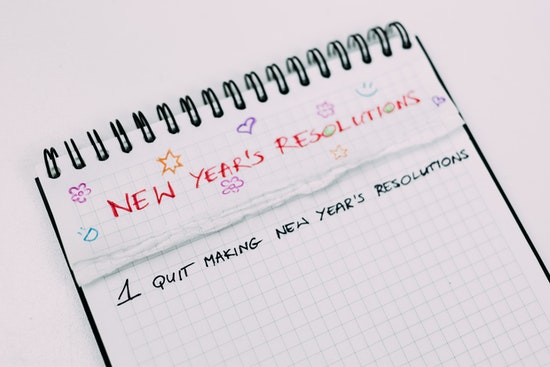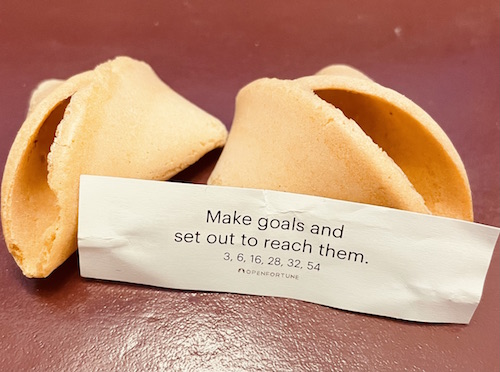Review & Renew for 2022: Resolutions, Goals, and Words of the Year

Snuggled in this week, tucked away between two major holidays, it’s tempting to rush to end the year with some sense of completion on those unfinished tasks. As much as we’d like to be mindfully in the present, we’re zipping along, trying to impose control in an era when there’s very little control to be had.
So today, I propose you take a breather. Bask in the quiet glow before we rush headlong into the future. Take time to do a little review of the past year so you can feel renewed, and if not in control, at least in awareness, for 2022.
TAKE A BACKWARD GLANCE
The best way to grow is to built on one’s successes. Grab a cup of cocoa (or whatever makes you feel alert but cozy) and settle in someplace comfy.
Pull out your calendar, whether it’s digital or paper bound, and start taking note of your successes, achievements, and delights. Personally, I think it’s best to keep a running list on paper (I mean, I am Paper Doll, after all), but if you prefer a spreadsheet, Word doc, or a note in Evernote, by all means, go with what feels comfy.
Look Beyond the Obvious
You can definitely list big accolades, awards, or milestones. Sure, mark down when you hit your revenue goal or finished that marathon. But look at those subtle successes, too.
What did you stick with, even when it was hard? Success isn’t always marked by what you attain, but how you persevere!
What did you try, even though it was out of your comfort zone? Succeeding at what you’re good at is worthy of pride, but stepping up to do something scary but potentially rewarding? That’s magical. (For more on that, check out my Sara Skillen’s Organizing and Big Scary Goals: Working With Discomfort and Doubt To Create Real Life Order.)
What surprisingly good things occurred that you had never even thought to imagine in the first place?
What dreams came true? Where did you decide to make new dreams when the old ones proved untenable (due to life or world circumstances)?
Janet Barclay’s excellent Set Your Compass to Reach Your Goals for the New Year introduced me to the free, downloadable YearCompass, an international marvel. Even if you get nothing else from today’s post, I encourage you to download this fillable, printable PDF and explore the questions. Examine your past year and get guidance for going forward.

I’m working my way through the digital version now, and it’s providing more insight than I’ve received from any prior annual review.
If you prefer an even deeper dive (and are willing to use up lots of Post-its®), try doing a life audit, examining the past, present, and future of your life. Or go shallower, cut to the chase, and stick to Apartment Therapy’s 6 Smart Questions to Ask Yourself at the End of the Year.
Not everyone can weave a tapestry of the past year out of the blocks of a calendar, so this is just a start. If you journal, flip through the pages to look for highlights, and recognize that bad days are actually achievements. You got through them and made it through the other side. (You’re here to read this, right?)
Surf through your social media posts. You may be surprised by what you find on LinkedIn or Facebook (or, yes, TikTok or Instagram). Look for a sense of all the big and little ways you did your thing, or helped others do their things! In particular, look at places where you were tagged for shoutouts and gratitude. There are lots of people always touting having gratitude, but sometimes it’s nice to notice and remember when you did something worthy of someone else’s gratitude or kudos.
Ah, kudos! Speaking of which, definitely check your Success Folder! Don’t have one? Create one! Actually, create two.
Have a digital success folder where you put emails that praise or thank you, or otherwise give you warm fuzzies. While you may get fewer and fewer things by mail, have a paper folder for collecting such tangible high-fives. On days where you are down on yourself, feel under-appreciated, or are disappointed, pulling out something that reminds you that “good stuff happens” and that you’re part of that chain of events is going to lift your spirits.
Engage With Your Village
Raising a child isn’t the only thing that takes a village; count on others to help lift your spirits and give you insight.
Talk to your people. We’re not always good at keeping formal records of our successes, but our friends and loved ones automatically catalog the snazzy things about us. Once, a friend was entering the workforce for the first time in decades, and was bemoaning the fact that she had no marketable skills. But because I’d known her (just about) forever, I was able to recite everything from events she’d run as a volunteer coordinator to the time she caught a PTA high muckety-muck embezzling! She sure-as-heck had marketable skills, but couldn’t immediately see them in herself, let alone recognize her own magnificence.
Want to increase the magic? Recognize your own successes, but also pay attention to your friends’ and colleagues’ achievements. Share their blog posts on your social platforms instead of just clicking “like.” Promote their professional highlights. And send them emails and even write to them the old-fashioned way so they have something to put in their own Success Folders!
MOVING FORWARD: TRIED AND TRUE FOR ’22
Armed with insight into what we achieved (and what we wish we had tried) in the prior year, we can approach the new year. First, we’ll look at the classic approaches, but we’ll also examine some exciting new ways to support our dreams as we move forward into 2022, even if it’s about to be “COVID’s junior year.”
Resolve to Evolve
In general, New Year’s resolutions come in two flavors, either positive or negative.
With positive resolutions, we say we’re going to proactively do something. Maybe we’ll do Couch-to-5K or learn a language. For negative resolutions, we plan to eliminate some aspect of our lives that we know is dragging us down, so we vow to go on a diet or stop hate-watching The Bachelorette.

Photo by freestocks.org from Pexels
Resolutions date back many, many centuries. Four thousand years ago, the Babylonians promised the gods they would return borrowed objects and repay outstanding debts. (If only the Babylonians had had professional organizers to help them declutter and locate the borrowed stuff and couch cushion money.)
The Romans promised their two-faced god Janus, who looked simultaneously backward and to the future, that they’d be good in the year to come. And for several hundred years, Christian watch night services have included traditions of reflecting on the prior year and making resolutions for the one to come.
In the United States, resolution-making continues to increase; up to 40% of the population makes a New Year’s resolution. On the up-side, these resolutions help us start the new year in a motivated, positive way – right when the weather, the amount of sunlight, our bank balances, and our moods are at an annual low-ebb. December 31st is when we feel our age and recognize the passing of another year of unfulfilled potential; resolutions rev our engines.
On the down-side, the vast majority of people abandon their resolutions before February. Resolutions fizzle for three reasons:
- our real lives get in the way (year after year after year)
- our resolutions may be things we’re supposed to do, but aren’t passionate about
- we haven’t identified working strategies for achieving our resolutions
So, if you are going to make a resolution, make sure you’re picking things that excite and challenge you, but also figure out how to eliminate the past obstacles and ease your path.
For inspiration on developing new or different resolutions, consider some of the following:
Good Housekeeping‘s 60 Achievable New Year’s Resolutions for Healthier and Happier Living 2022 has less all-encompassing, more bit-sized resolutions, like “Prioritize age-appropriate health screenings,” “eat more vegetables,” and “listen to novels while you work out.
The Pioneer Woman has 40 New Year’s Resolution Ideas to Start 2022 Right, with some fun, sociable ideas like “give more compliments,” “send more cards,” and “make time to spend with family and friends.”
And Antimaximalist’s whopping 67 New Year’s Resolutions for 2022 prioritizes hopeful notions like, “Don’t settle for less than you deserve” and “Be less afraid of making mistakes.”
You can resolve to do things that are fun, too. Gretchen Rubin made a list of 21 things she wanted to do in 2021:
Here’s my 21 for 2021 list. I got a fair number of things crossed off my list. Now I’m writing my 22 for 2022 list—and deciding what items to carry over from 2021. pic.twitter.com/KmdMXUBAPu
— Gretchen Rubin (@gretchenrubin) December 21, 2021
and has a PDF to help you track your 22 in ’22.
Embrace Good Goals and Happy Habits
So, how can you supercharge your resolutions? Maybe stop thinking of them as big, sparkly things you resolve to do (with the unspoken societal expectation that it’ll all fall through), and consider the less flashy younger siblings of resolutions, ye old goals and habits.
Think of goals as providing the big-picture framework, the big city markers on the map; habits are the turn-by-turn directions to get you where you want to go.

SMART goals are popular because they identify where resolutions and plans often fail.
- Specific (What are you going to do? Use action verbs! Where and when are you going to put these efforts into effect? With whose help or partnership will you get there?)
- Measurable (What metrics will you use to show you’ve done what you said you’d do? How many miles per day? How many lessons per week? How many blocks of time for achieving specific tasks?)
- Achievable (Is this a practical goal? Is it realistic?)
- Relevant (Does this goal make sense for your life, family, or business?)
- Time-based (When will you start? When will you perform the action? When will you repeat it? When will you finish? Remember, “Someday” is not a day on the calendar!)
And Paper Doll readers know that I prefer SMARTY goals, where that Y reflects the idea that these are goals that are meaningful to YOU, not your mother-in-law, boss, or favorite Instagram influencer.
I prefer SMARTY goals, where that Y reflects the idea that these are goals that are meaningful to YOU, not your mother-in-law, boss, or favorite Instagram influencer. Click To TweetWhether you want to lose weight, pay off debt, find a significant other, or grow your business, the goal can’t just be a vague “what I want” without any guideposts. Make sure your goals spell out what you’re going to do, how you’re going to do it, and how you’re going to measure your success.
So, if your goals set the rules and create the game plan, habits are how you get to the finish line.
If your goal is to get to work on time every day, but you often find yourself searching the house for your keys, wallet, phone, and charger, then you’ll want to develop a habit of assigning a “home” and always putting those items in the home upon returning to your house, before you even take off your shoes. If your goal is to be prepared at tax time, then your habits involve doing weekly record-keeping and filing, and not waiting until April 12th to get started.
Habits are your settled or repeated tendencies. Sure, bad habits become second nature, making them hard to break, but good habits are hard to break, too! So, if you can get in the habit of repeating positive, life-affirming tasks, you stand a much better chance of achieving your goals.
I recommend a few superior books for understanding how habits work, and how you can put them to use in your life. Both are becoming modern classics.







I use the word of the year and have for at least 10 years. I find it very powerful. This year my word is “soar”, and I am still working through the steps of understanding how this will work for me.
I was all set to shout “Soar like an eagle, let my spirit carry me” but apparently the song (by Steve Miller, redone by Seal) is “Fly Like an Eagle.” But that was the first thing I thought of, so I hope your spirit soars through 2022! (Much better than the part where it goes, “Time keeps on slippin’, slippin’, slippin’ Into the future,” is what happens if we don’t plan!
Great post! I like to reflect on the prior year between the holidays and then set regular yearly goals in various areas of my life, personal, business, family, health, etc. Dividing my list up this way helps me see the possibility of achieving them.
What an *organized* way of reflecting on your year, by categorizing the different aspects. I’m sure your 2022 will be full of achievements!
Wow, I really like the idea of recalling and celebrating the things we’ve tried and the things we’ve stuck with. These remind us to value the effort we put it, rather than worship the outcome (some aspects of which we have no control over!).
Both my daughter and I got Atomic Habits for Christmas, so we are going to read it together. I think having someone to talk about a book with always helps me engage at a greater level.
Love that Ted Lasso “Believe.” Can’t wait for the next season to come out!
Thanks, Seana. I’m with you — and I love they way you put it. Let’s value the effort, not worship the outcome! I’m going to be quoting you on that. (In fact, that should be one of the quotes for your challenge!) And buddying up to read and discuss the book makes it the best tiny book club for tiny (atomic!) habits!
You outdid yourself with this one, Julie! There are so many gems here. I love how you wrote how “bad days are actually achievements” because you made it through and are still here. That’s a wonderful perspective to take when looking through calendars, activities, and journals. And how does that expression go? -Our challenges make us stronger.
You are the master of finding awesome videos. While I’ve read Duhigg’s and Clear’s books on habits (and love them both,) I never saw Duhigg’s video, which is fantastic. Even though he shares those concepts in his book, there is something powerful about listening to him as he explains the basics of cue > routine > reward.
I’ve started the New Year using one word, an intention, or specific goals. Amazingly, they all work. I don’t have a way of deciding which method to use. I feel my way forward. Whichever way I choose, I make time to reflect on the year ending and future-think about the New Year. For 2022, I’m going with one word- FLOURISHING. I will use its “flavor” to set the tone and intention for my choices and experiences. I’m looking forward to immersing myself in the growth and positivity it will encourage me to embody.
I’m blushing! Thank you, Linda. I really put my heart into this one, as I want everyone to be empowered going into 2022.
Yes, our challenges make us stronger, not because they make us tougher, but because they make us smarter, and best of all, they teach us that no one failure, no one moment of backsliding, will mark the end. I’m a big believer in the notion, “It’ll all be OK in the end. If it’s not OK, it’s not the end.” Struggles teach us that we can make it through!
I’m glad you like the videos; I think they add energy to a post, and I’m always happy I’m not the one having to make the video!
Flourishing is a fabulous word, and I love that it has only positive connotations. I’m still working on my word, but hoping by the end of this week and my YearCompass efforts, I’ll have one to share. Thank YOU for sharing!
You’ve packed a lot of juicy goodness in this post, and I am truly honoured that you mentioned me. My word for 2022 is tentatively but most likely NURTURE.
I had to mention you, Janet, as you were the inspiration for a whole section of the blog, and in fact, you are often the inspiration for posts and ideas. You do an AMAZING job of nurturing everyone in our profession, and I know your 2022 will be full of achievements! Thank you for reading!
I am beyond humbled! I believe this is my first link back! What an absolutely wonderful and thorough resource. I am so honored to to be included in this treasure of an article! ??. Happy New Year!!
I’m delighted that you enjoyed being part of this year-end review & renew post. Feel free to share it and let everyone know you were included as an expert source! And have a wonderful 2022!
Thank you for your wise and inspiring words, as always. When I reflect on this year, I am grateful for your friendship AND excellent TV show recommendations. Ted Lasso was a game changer for me!
BELIEVE, babe. BELIEVE!
I like that you added the W to smart goals. Adding YOU to the equation is so smart.
I did some looking back at 2021 and am happy with my accomplishments. But I decided to set quarterly goals for 2022. I have all my business projects lined up for Q1 and am making a future projects list as well. I set aside a day each quarter to focus on this. Hoping it will keep me on track.
That sounds like an excellent approach, and going quarter-by-quarter lets you tweak things as you go along. Fabulous!
I love SMART goals! Excellent post as always, I’m looking forward to using these techniques to make 2022 my best year.
Thank you for reading, and I hope your SMART(Y) goals bring you a fabulous 2022!
In 2022 I’m reusing my 2021 word, which was lost in the 2020 shuffle: PROGRESS. It stands for two mantras: “Progress equals happiness,” and, “Progress, not perfection.” And it refers to progress in all aspects of life for which I have goals. I also used PROGRESS once several years ago. I don’t hear about people using the same word all the time, but if it ain’t broke…(2020 aside)…
Well, you certainly made progress in 2021 with your newly published book, so I think progress is a great word for you. And why not keep what works? I wish you a full year of progress in 2022, Hazel! See you on the flip side!
Thanks for the inspiration, Julie! I’m getting ready to do my annual review and goal setting for 2022! This is just what I needed!
Fabulous, Yve! I hope you recognize your magnificence in 2022!